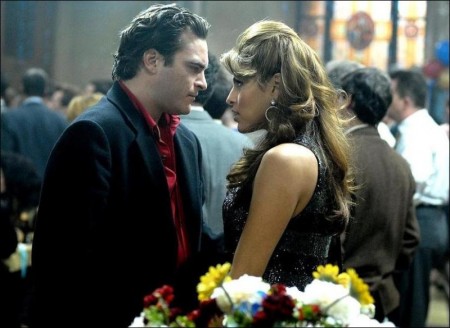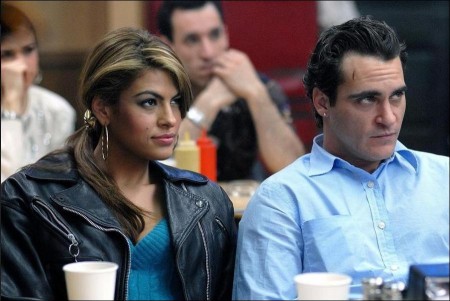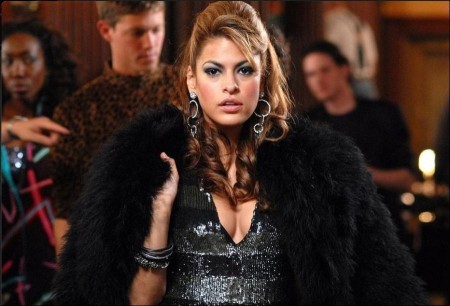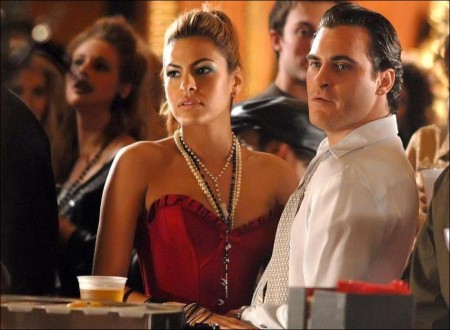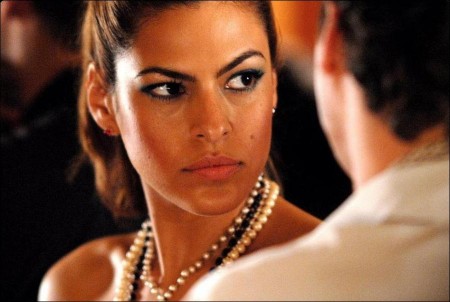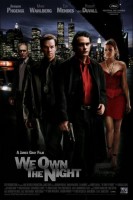As decorated NYPD cops Joseph Grusinsky (Mark Wahlberg) and his father, Burt (Robert Duvall), prepare to take on a newly powerful and dangerous Russian drug dealer, they never thought they would be turning to Joseph’s black sheep brother, Bobby. Caught in the middle, Bobby and his girlfriend, Amada (Eva Mendes), are forced to choose sides – between the familial ties he has rejected and a future he cannot avoid. Columbia Pictures’ and 2929 Productions’ We Own the Night is an emotional crime thriller written and directed by James Gray.
The film, which takes its title from the motto of the 1980s-era NYPD street crimes unit, was produced by Nick Wechsler, Marc Butan, Mark Wahlberg, and Joaquin Phoenix, and executive produced by Todd Wagner, and Anthony Katagas.
About the Production
Writer-director James Gray, who previously garnered critical acclaim for his films The Yards and Little Odessa, takes the helm of Columbia Pictures’/2929 Productions’ We Own the Night. “This is a film that works in a specific and familiar genre – the police movie,” explains Gray. “But normally the police movie focuses on procedure – finding the bad guy. I wanted to do something much more focused on character and emotion. The genre becomes a point of departure to tell a story about a man caught by his destiny, his inevitable fate, and the complex and internally conflicted emotions that love, loss, and betrayal yield.”
As it explores the emotional relationships between the characters, We Own the Night employs a very particular kind of storytelling. “I guess what I’m doing could be called classical storytelling,” Gray says. “I’m not interested in ‘what will happen’ to Bobby, but how will it happen? It’s an idea that dates back to the ancient Greeks – that one’s life is shaped primarily by forces outside of one’s control, as if the gods have dealt each person a fate – a destiny. The Greeks had no interest in the whodunit – if you were focused on that, you weren’t focused on character.
“A man’s ability to change his own fate is much more limited than we would like to believe,” says Gray. “Other factors play a big role in life – the flow of history, culture, family, external events, instinct, and love. This is what I wanted explore.”
The idea for the film began when a studio executive suggested to Gray that he write “a cop movie with a car chase.” Without any initial ideas about how to bring this about, Gray conceived the story that would become We Own the Night when he saw a New York Times photograph of a police funeral. “In the photo, all of these grown men were hugging…in tears after one of their fellow officers had been killed in the line of duty,” recalls Gray. “And the image had such tremendous emotion.”
He realized this was an aspect of cop life he could investigate – and as the film would use the procedural only as a backdrop for the more emotional story, it would be different from many other movies now playing at a theater near you. “You don’t see too many cop movies about family and emotion,” he says.
“I tried very hard to make the emotion in the film earnest and sincere,” Gray continues. “You could say it’s melodrama – which is a pejorative term, but doesn’t have to be. Bobby’s emotions at certain points in the film can be melodramatic, but it’s OK because his performance invites outside emotion – and I think that’s cinema’s highest calling.”
Still, Gray never forgot he was working within a genre. “I was anxious to make something not just thrilling, but explosive, dramatic. And frankly, filled with action – of course, there’s that car chase,” he says.
So, beginning with that suggestion for a cop movie with a car chase, We Own the Night began the long journey of coming to the screen. Gray was going on ride-alongs with the NYPD as early as 2001; by 2003, he had finished the first draft of the screenplay, which he wrote specifically for the two actors that would play the main characters: Joaquin Phoenix and Mark Wahlberg.
“This is a very personal movie,” continues Gray. “That doesn’t mean autobiographical. As I was writing the screenplay, I used elements that came from local news stories as well as things I learned by going on police ride-alongs. I found many stories about people who, because of their circumstances, hid their family connections to the police. Everything you see in the film came from real events but I also used my relationships with my father and brother. So I did steal a lot from my background as well.”
Gray was also influenced by two archetypal Bible stories about brothers: Cain and Abel, of course, but also – and especially – the story of Joseph and his brothers. “That story is why Wahlberg’s character is named Joseph,” he says. In the story, the brothers, jealous of Joseph, plot to murder him; he is instead sold into slavery, but rises to become advisor to a king. Years later, he comes face to face with his brothers again. “It’s a very moving story because it’s about brotherly love – he has total forgiveness, and that’s I’m sure what’s discussed in bible study – but what’s also true is that there’s terrible stuff: they try to kill their own brother!” Gray notes. “That’s the dual nature of familial relationships – family can be both a locus of emotional support and love but also something quite devastating.”
As such, Gray sought an ending that may be read on many different levels. “Many people are going to watch this movie and think it’s about Bobby’s redemption, and that’s fine,” he says. “But to me, there is no redemption, because he wasn’t a bad person at the beginning of the story. He wasn’t dealing drugs or murdering people – he was just having a good time. He is put through the wringer and comes out forged by destiny – there is nothing he can be but a cop. But while he’s becoming a good person in the eyes of society, he’s at the same time destroying a large part of himself that was so appealing.
To him, he’s become a compromised soul. His life is totally and irrevocably changed – and maybe for the worse. It’s the opposite of what you expect in this kind of movie. “I was looking for an ending that wasn’t upbeat, because that seemed like a lie, but wasn’t downbeat either, because it seemed gratuitous,” Gray concludes. “I wanted life, good and bad.”
Eager to re-team with Gray after working with him on The Yards were Joaquin Phoenix and Mark Wahlberg, both of whom have earned considerable acclaim since working together on Gray’s 2000 film. Phoenix won a Golden Globe for Best Actor for his role in the 2006 film Walk the Line and has twice been nominated for Oscars, for his roles in that film and in Gladiator. Wahlberg was critically praised for his role as a tough talking Boston sergeant in Martin Scorsese’s Oscar-winning film The Departed, for which he earned both a Golden Globe and Oscar nomination.
Signing on as producers of We Own the Night, Phoenix and Wahlberg were enthusiastic about a second collaboration with Gray. “James truly cares about film. In an age of such self-conscious irony, that is a rare quality,” says Phoenix. “James is willing to dig through glass to uncover the truth in each moment, and he stimulates those around him to do the same. I couldn’t wait to get back into the ring with him and explore the emotional machinations of this family.”
“James is incredibly talented and working with him and Joaquin on The Yards was a great experience,” says Wahlberg. “I was especially flattered that he wrote the part of Joseph in We Own the Night for me.”
Wahlberg says that he particularly identified with the role. “I have friends who are cops and friends who are crooks, and they come from the same families,” he says. “I grew up in that world and I find it fascinating.”
Producer Nick Wechsler, who worked with Gray on his two previous films, Little Odessa and The Yards, observes, “James developed such a strong rapport with these two actors. He was thinking of them throughout his research and writing process – it was almost like a shortcut to making a successful movie.”
Says Gray, “Mark has tremendous sensitivity, a real emotional truth about him. He has a kind of blue-collar earnestness that would remind you of John Garfield from late ’40s movies.
“Joaquin is wonderful in a very different way,” he continues. “He reminds me of Montgomery Clift or Al Pacino, someone who has got tons of internal conflict and is about to explode any second.”
Phoenix says that preparing for the role required emotional preparation. “You don’t dive into a film like this; you dip a toe in and acclimate,” he says. “With James’ films, the emotions of the characters take precedence over plot. We spent six weeks in New York, as we were preparing to shoot, talking about the histories of the characters.”
Phoenix, who previously teamed with Gray on The Yards and is now preparing to shoot (in the director’s words) a “tragic romance” with the director, says that this kind of research and commitment to character is a given on a James Gray film. “James really does protect actors,” Phoenix says. “He keeps them in the space they’re meant to be in and won’t leave a scene until he feels that he has it. As an actor, you learn to trust him, which allows you to explore different aspects of the scene and the characters. It’s very exciting.”
Gray wrote the part of Bobby’s and Joseph’s father, the decorated deputy chief Burt Grusinsky, specifically for Robert Duvall. The six-time Oscar nominee won an Academy Award for Best Actor in 1984 for his role in Tender Mercies and has been the recipient of four Golden Globes.
“Joaquin calls Duvall the Jedi master,” says Gray. “You can throw Duvall any curveball and he’ll come right back at you in character and he’ll do something amazing. The level of the craft is ridiculous.”
Duvall was in Virginia driving home from a vacation when Gray called and asked him to take the role. “I was glad I could play it – and work with these very talented people,” says Duvall. “Joaquin and Mark are really talented guys.”
Duvall was especially motivated to work with Gray when James Caan, who co-starred with Duvall in The Godfather and co-starred in Gray’s film The Yards, told Duvall about Gray’s talent. “And I found that to be true on this,” says Duvall. “He’s one of the best directors I’ve worked with in my whole career, as good as any of them.”
According to Gray, Duvall is so comfortable and creative with improvisation that he raised the game of everyone around him. Although the two younger actors had obvious reverence for Duvall, Gray observes that, “Duvall can’t stand that respect or distance. He likes to feel like he’s in the trenches with them. But Joaquin would do everything he could do to really get Duvall’s character angry with him. He even wore an earring strictly so that Duvall would look at him and think ‘you little wimp.’”
Phoenix sees it differently. “I’m not naïve or arrogant enough to think that I’m going to have any effect on Robert Duvall’s performance,” he says. “I’m sure he’s capable of generating the emotion for the scene himself. I do these things for myself – I’ll manipulate the situations so that it affects me in a particular way. You manipulate yourself in order to find some truth.”
“On the other side,” Gray adds, “Mark Wahlberg was telling me, ‘Don’t bother Duvall, Jim. He’s a great actor.’ And their dynamic mirrored the respectful dynamic of Burt and Joseph in the film.”
“Duvall reminds me so much of my dad – the only thing missing is the Boston accent,” says Wahlberg. “I was thrilled at the opportunity to work with him. I’d never met him before our first day on the set – it was a great experience.”
The last piece of major casting would be Bobby’s girlfriend, Amada. Gray was watching TV in a New York hotel room when he saw an interview with actress Eva Mendes, who had earned critical attention for her roles in Training Day and Hitch. “She had a look of sophisticated bemusement in the interview,” admits Gray. “And I thought I’d like to meet her and see what she’s about.”
What he found in her was sensitivity and self-awareness, both ideal qualities for the role of Bobby’s loyal girlfriend who is unprepared for the deep sacrifices she will have to make in order to maintain their relationship.
To research her role as a party-girl who is caught up in the club world of the ’80s, Mendes spent time with former Studio 54 owner Ian Schrager and “picked his brain.” She discovered that the period was “a crazy, free-for-all moment, when there were zero consequences.”
Mendes found that her character – like Phoenix’s – really has no choice as events progress toward their conclusion in the film. “It’s heartbreaking,” she says. “She’s in love with him, but he’s no longer the same person she fell in love with. All she wants is her old life back, but she knows that can’t happen. She has no choice but to walk away.”
Says Gray, “Because I knew Joaquin and Mark, I knew what they were capable of. Bobby Duvall is a legend. But Eva pleased and surprised me most. She has a tremendous reservoir of emotion inside. It’s a great thing to see.”
Mendes had an equally gratifying experience working with her director. “James is completely different from anyone else I’ve ever worked with,” she says. “I’ve never been pushed so much before. He never wavered in his conviction that I was the right person for the role. It was intense, but now, I think it’s the only way to work.”
* * *
Gray’s script and his solid relationship with outstanding actors attracted the attention of 2929 Productions, an entertainment company established by Todd Wagner and Mark Cuban. The company’s president, Marc Butan, learned about the project and was immediately drawn to the characters.
“I thought the characters in this world were fantastic,” says Butan. Elaborating on the story, Butan says, “It’s a movie set in the cops vs. underworld wars, but it’s also a story about Bobby’s family situation. It combines action and drama in a way that serves both.
“And what James found in this era was that the Russian Mafia was on the rise as the Italian mafia was on the decline,” Butan continues. “The rules of engagement were breaking down and redefined between cops and criminals.”
The challenge for a director who shoots his own script is maintaining control while also adapting to surprises along the way. As Gray explains it, “Every movie is like a wild horse that’s going to get away from you…because it’s a collaborative medium and the actors may take the scene in another direction. So a director has to be the ultimate filter – embracing the things that expand your original ideas, but at the same time, eliminating things that destroy or harm what you originally had in mind.”
* * *
Music plays an integral role in We Own the Night, as it establishes not just the period but also the tone of the film. An aficionado of blues, jazz, and classical music, Gray tried to evoke the ’80s with disco music in the club scenes – but to underline the more austere emotions of the film, he turned to Wojciech Kilar, the legendary Polish maestro whose works have been performed by dozens of international orchestras and who has composed more than 35 film scores including those for Bram Stoker’s Dracula, The Pianist, and The Portrait of a Lady.
Music Supervisor Dana Sano, who is also re-teaming with Gray after their work together on Little Odessa and The Yards, filled the Brooklyn nightclub with signature songs by Blondie, David Bowie and The Clash, but compliments the director for his choice of classics from Louis Prima to Tito Puente for a party scene with families of New York police.
Distinguishing Gray as a “filmmaker, not a movie director,” she admires his sophisticated musical taste and broad knowledge of obscure music from little-known foreign films.
Gray’s attention to detail resonated throughout the production – from the camera department to props, where property master Robert Currie was given the challenge of researching, finding or manufacturing authentic items from the late ’80s.
“It’s not like there’s a 1988 police store out there,” he laughs. “So we had to do a lot of research. And that’s been the whole umbrella of this movie, paying attention to the detail and making it as authentic as possible.”
It is this combination of authentic period detail, rich human drama, and visceral action that Gray achieves in We Own the Night. “It’s funny, so many things have influenced me while working on this story but I think the most important is Henry IV,” he says, “which is ultimately about a man who has to sacrifice a really fun but frivolous life to take his place in history. Henry IV located all these complex emotions and action choreography in such an elegant, simple story structure. We Own the Night isn’t exactly Shakespeare, but I wanted to try to harness that kind of basic archetypal story.”
Production notes provided by Columbia Pictures.
We Own the Night
Starring: Joaquin Phoenix, Mark Wahlberg, Robert Duvall, Eva Mendes, Alex Veadov, Oleg Taktarov
Directed by: James Gray
Screenplay by: James Gray
Release Date: October 12, 2007
MPAA Rating: R for strong violence, drug material, language, some sexual content and brief nudity.
Studio: Columbia Pictures (Sony)
Box Office Totals
Domestic: $28,563,179 (52.3%)
Foreign: $26,095,863 (47.7%)
Total: $54,659,042 (Worldwide)
